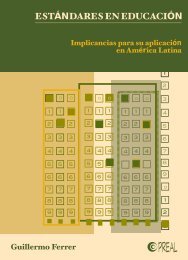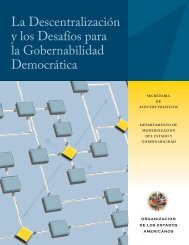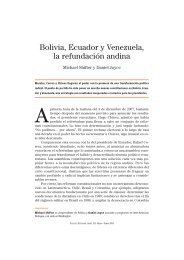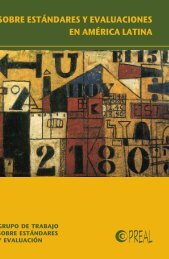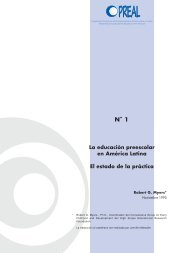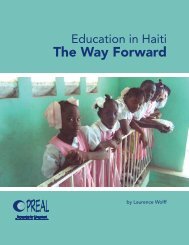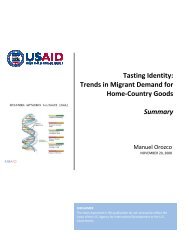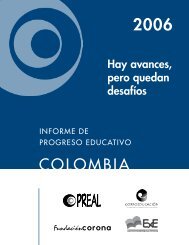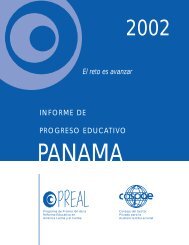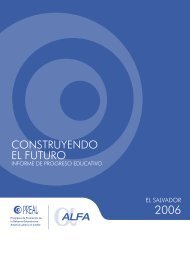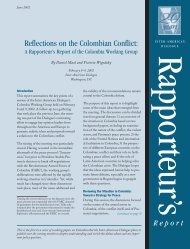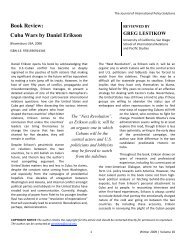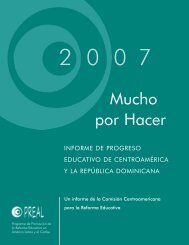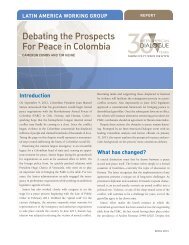Inter-American Dialogue
Inter-American Dialogue
Inter-American Dialogue
Create successful ePaper yourself
Turn your PDF publications into a flip-book with our unique Google optimized e-Paper software.
“The most<br />
important thing my<br />
colleagues in the<br />
<strong>American</strong> Congress can<br />
do is to lead by<br />
example—becoming<br />
active and continuing<br />
participants in efforts<br />
like the <strong>Inter</strong>-<strong>American</strong><br />
<strong>Dialogue</strong>’s parliamentary<br />
network. Congress could<br />
also help by providing<br />
financial support<br />
for initiatives like<br />
this one.<br />
”<br />
(Article by Senator<br />
Bob Graham in<br />
New York Times,<br />
December 24, 2000)<br />
2<br />
INTER-AMERICAN DIALOGUE<br />
2000 Program Report<br />
the <strong>Dialogue</strong>’s policy report A Time for<br />
Decisions: U.S. Policy in the Western Hemisphere.<br />
At a December 14 press briefing, the<br />
<strong>Dialogue</strong> presented the report’s recommendations<br />
to the Bush administration on<br />
reshaping U.S. policy toward Latin America.<br />
The report highlights recommendations<br />
to move forward with “fast track,” reach a<br />
trade agreement with Chile, and follow a<br />
new policy of engagement with Cuba.<br />
Other key recommendations include: the<br />
need for greater cooperation between the<br />
United States and both Mexico and Brazil,<br />
and the importance of continuing U.S. support<br />
for the Colombian government in its<br />
war against guerrillas. Emphasis was also<br />
given to the upcoming Summit of the<br />
Americas in Quebec City as a way to reinforce<br />
and amplify the U.S. commitment to<br />
a multilateral agenda.<br />
Other key <strong>Dialogue</strong> activities included initiatives<br />
designed to improve Latin America’s<br />
recent economic reforms; launch concrete<br />
recommendations for U.S. policy<br />
toward Brazil, Colombia and Cuba; analyze<br />
the latest political and economic developments<br />
in Argentina, Chile, Colombia,<br />
Mexico, Peru, Venezuela, and elsewhere;<br />
and enrich the quality of debate on U.S.<br />
policy toward Latin America and the<br />
Caribbean.<br />
We were pleased to have the opportunity to<br />
host President Miguel Angel Rodríguez of<br />
Costa Rica, President-Elect Hipólito Mejía<br />
of the Dominican Republic, as well as presidential<br />
candidates Francisco Arias Cárdenas<br />
of Venezuela, Alejandro Toledo of Peru,<br />
and Vicente Fox of Mexico, who was elected<br />
president on July 2. We also organized<br />
discussions with finance, defense and foreign<br />
ministers, trade leaders from throughout<br />
the hemisphere, as well as key policymakers<br />
from Washington and top analysts<br />
from Wall Street. And we assembled major<br />
conferences on a wide range of topics,<br />
including educational reform, legislative<br />
leadership, press freedom, race and ethnicity,<br />
Central <strong>American</strong> integration, women in<br />
political power, and the future of Western<br />
Hemisphere affairs.<br />
Leadership Networks<br />
The <strong>Dialogue</strong>’s networks incorporate public<br />
and private leaders from throughout the<br />
hemisphere to address critical inter-<strong>American</strong><br />
policy issues. They reflect the changes<br />
in leadership in the hemisphere, enhance<br />
communication across countries, and<br />
engage new groups of analysts and practitioners<br />
in the <strong>Dialogue</strong>’s activities.<br />
� The second meeting of the Network of<br />
Legislative Leaders—organized by the<br />
<strong>Dialogue</strong> in cooperation with the Organization<br />
of <strong>American</strong> States (OAS)—<br />
took place on April 1 and 2 in San José,<br />
Costa Rica. This politically diverse group<br />
of some 50 selected legislative leaders<br />
from the United States, Canada and 14<br />
Latin <strong>American</strong> and Caribbean countries<br />
discussed challenges facing the hemisphere’s<br />
legislatures and identified ways<br />
to improve their performance. OAS Secretary<br />
General César Gaviria, White<br />
House Special Envoy Buddy MacKay,<br />
and Costa Rican President Miguel Angel<br />
Rodríguez also participated. As part of<br />
the network’s efforts, Chairman Bill Graham<br />
of the Foreign Relations Committee<br />
of the Canadian Parliament and U.S.<br />
Senator Bob Graham traveled to Brazil<br />
and Bolivia with <strong>Dialogue</strong> president<br />
Peter Hakim in January for a series of<br />
meetings with key congressional leaders,<br />
corporate executives, and senior government<br />
officials, including Brazilian President<br />
Fernando Henrique Cardoso and<br />
Bolivian Vice President Jorge Quiroga.<br />
They were joined by senior advisor to<br />
President Clinton’s special envoy for the<br />
Americas, Alexandra Arriaga.<br />
� The newly formed steering committee of<br />
the Women’s Leadership Conference of<br />
the Americas (WLCA)—the five year-




